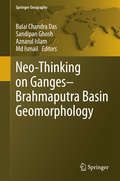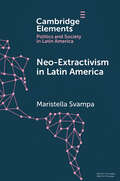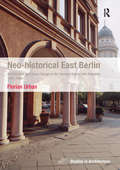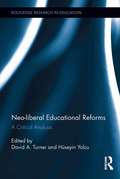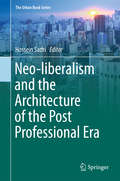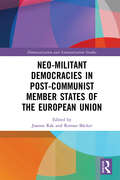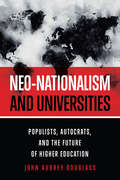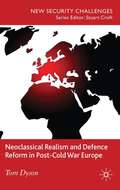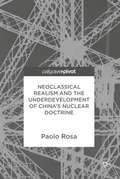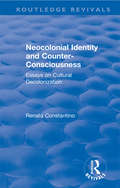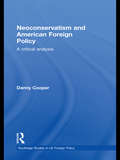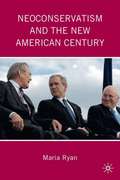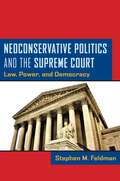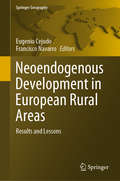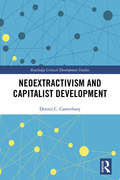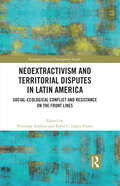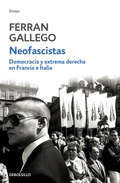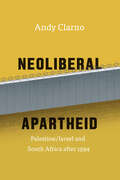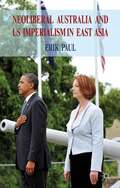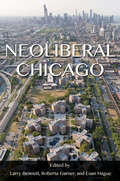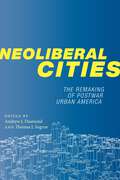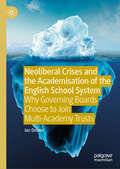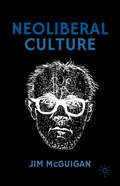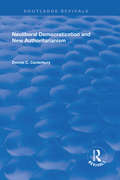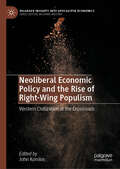- Table View
- List View
Neo-Thinking on Ganges-Brahmaputra Basin Geomorphology
by Balai Chandra Das Sandipan Ghosh Aznarul Islam Md IsmailThis book explores the latest advances in our understanding of the evolution of the Ganga-Brahmaputra delta, examining the Damodar basin, Bhagirathi-Hooghly basin and Jalangi basin from historical, quantitative and applied geomorphology perspectives. The evolution of the Ganga-Brahmaputra delta is highly complex and remains poorly understood. To address that gap, this edited volume presents 11 research papers: the first seven chapters focus on the pure geomorphology and geohydrology of the delta, while the remaining four examine its applied geomorphological aspects. The book offers a valuable guide for geologists, geographers, hydrologists, landscape ecologists, environmentalists, engineers, planners and policy makers.
Neo-extractivism in Latin America: Socio-environmental Conflicts, The Territorial Turn, and New Political Narratives (Elements in Politics and Society in Latin America)
by Maristella SvampaThis Element analyses the political dynamics of neo-extractivism in Latin America. It discusses the critical concepts of neo-extractivism and the commodity consensus and the various phases of socio-environmental conflict, proposing an eco-territorial approach that uncovers the escalation of extractive violence. It also presents horizontal concepts and debates theories that explore the language of Latin American socio-environmental movements, such as Buen Vivir and Derechos de la Naturaleza. In concluding, it proposes an explanation for the end of the progressive era, analyzing its ambiguities and limitations in the dawn of a new political cycle marked by the strengthening of the political rights.
Neo-historical East Berlin: Architecture and Urban Design in the German Democratic Republic 1970-1990 (Ashgate Studies in Architecture)
by Florian UrbanIn the years prior to the fall of the Berlin Wall, the leaders of the German Democratic Republic planned to construct a city center that was simultaneously modern and historical, consisting of both redesign of old buildings and new architectural developments. Drawing from recently released archival sources and interviews with former key government officials, decision-makers and architects, this book sheds light not only on this unique programme in postmodern design, but also on the debates which were taking place with the Socialist government.
Neo-liberal Educational Reforms: A Critical Analysis (Routledge Research in Education)
by David A. Turner HThis volume gathers a cast of eminent scholars for a critical and comparitive analysis of how neoliberal education policies have functioned in a range of countries in different stages of economic development. Treating case studies from Europe, Asia, the Americas and the Middle East, the volume shows how globalization operates differently in different societal contexts.
Neo-liberalism and the Architecture of the Post Professional Era (The Urban Book Series)
by Hossein SadriThis book discusses the effects of Neo-Liberal policies on the transformations of architectural and urban practices and education in the transition from the era of “professionalism” to “post-professionalism.” Building on previous literature in the field of contemporary theory of architecture, it provides the necessary resources for the study of contemporary architecture and urban politics, urban sociology, local administration and urban geography. Further, it develops a political and critical perspective on contemporary practices of architecture and urbanism, their implementation, legal background, political effects and social results.The book will interest readers from a wide range of academic disciplines, from political science to architecture, and from urban studies to sociology.
Neo-militant Democracies in Post-communist Member States of the European Union (Democratization and Autocratization Studies)
by Joanna RakThis book examines contemporary militant democracies in post-communist states in the European Union.Examining, through case studies, their broader relevance to political, legal, and social structures, this book looks in revealing detail at the struggles between these democratic and anti-democratic actors that share similar historical experiences of contentious politics, communism, and political transformation. It importantly unravels the tension between them, determining which are already authoritarian, and which are teetering on the brink of an anti-democratic breakthrough. Analysing regimes’ continuance trajectories to capture how and what shaped the neo-militant aspects of democracies (neomilitancy) over time, the book accounts for why particular post-communist European neo-militant democracies emerge while others decline or transform into quasi-militant democracies despite transformation, how they differ from each other, what brings about the differences and similarities between them, and how and why they change over time. With right-wing populist parties coming to power on the back of fears associated with economic, social, and cultural globalisation and the misuse of state authorities to strengthen protective measures against threats to democratic institutions, the book represents a timely and important contribution. This book will be of key interest to scholars and students of Post-Soviet/Communist/East European Studies, Democratic Backsliding, European and Comparative Politics, Nationalism and Ethnic Conflict, Democracy and Dictatorship, Public Comparative Constitutional Law, Human Rights Law and Political Theory.
Neo-nationalism and Universities: Populists, Autocrats, and the Future of Higher Education
by John Aubrey DouglassThe rise of neo-nationalism is having a profound and troubling impact on leading national universities and the societies they serve. This is the first comparative study of how today's right-wing populist movements and authoritarian governments are threatening higher education.Universities have long been at the forefront of both national development and global integration. But the political and policy world in which they operate is undergoing a transition, one that is reflective of a significant change in domestic politics and international relations: a populist turn inward among a key group of nation-states, often led by demagogues, that includes China and Hong Kong, Turkey, Hungary, Russia, Brazil, the United Kingdom, and the United States. In many parts of the world, the COVID-19 pandemic provided an opportunity for populists and autocrats to further consolidate their power. Within right-wing political ecosystems, universities, in effect, offer the proverbial canary in the coal mine—a clear window into the extent of civil liberties and the political environment and trajectory of nation-states.In Neo-nationalism and Universities, John Aubrey Douglass provides the first significant examination of the rise of neo-nationalism and its impact on the missions, activities, behaviors, and productivity of leading national universities. Douglass presents a major comparative exploration of the role of national politics and norms in shaping the role of universities in nation-states—and vice versa. He also explores when universities are societal leaders or followers: When they are agents of social and economic change, or simply agents reinforcing and supporting an existing social and political order.In a series of case studies, Douglass and contributors examine troubling trends that threaten the societal role of universities, including attacks on civil liberties, free speech, and the validity of science; the firing and jailing of academics; anti-immigrant rhetoric; and restrictions on visas with consequences for the mobility of academic talent. The book also offers recommendations to preserve the autonomy and academic freedom of universities and their constituents. Neo-nationalism and Universities is written for a broad public readership interested and concerned about the rise of nationalist movements, illiberal democracies, and autocratic leaders.Contributors: José Augusto Guilhon Albuquerque, Elizabeth Balbachevsky, Thomas Brunotte, Igor Chirikov, Igor Fedyukin, Karin Fischer, Wilhelm Krull, Brendan O'Malley, Bryan E. Penprase, Marijk van der Wende
Neoclassical Realism and Defence Reform in Post-Cold War Europe
by To DysonDyson explains the convergence and divergence between British, French and German defence reforms in the post-Cold War era. He engages with cultural and realist theories and develops a neoclassical realist approach to change and stasis in defence policy, bringing new material to bear on the factors which have affected defence reforms.
Neoclassical Realism and the Underdevelopment of China’s Nuclear Doctrine
by Paolo RosaThis book addresses the under-researched discourse of the evolution of Chinese nuclear posture, and in particular, explains the absence from this evolution of a coherent and well-defined operational doctrine. Using a neoclassical realist framework, the book explains why China, after having launched a crash programme in the mid-1950s to develop a nuclear deterrent, did not debate a clear operational doctrine with respect to targeting and employment until the mid-1980s.
Neocolonial identity and counter-consciousness: essays on cultural decolonization (Routledge Revivals)
by Renato ConstantinoThis title was first published in 1978. This book offers examples of the writings of Renato Constantino, one of the Philippines' most prolific essayists. Editor Meszaros summarizes their unifying theme: 'The colonial strangehold on consciousness is the crucial factor through which the whole society is dominated... The subversion of colonial consciousness through the development of a 'counter-consciousness' inevitably means also the end of colonial domination at all levels and in all spheres'. This collection includes thirteen essays , the earliest written in 1958 and the latest in 1976.
Neoconservatism and American Foreign Policy: A Critical Analysis (Routledge Studies in US Foreign Policy)
by Danny CooperAt the time of America’s 2003 invasion of Iraq, the term "neoconservative" was enjoying wide currency. To this day, it remains a term that engenders much debate and visceral reaction. The purpose of this book is to critically engage with a set of ideas and beliefs that define the neoconservative approach to American foreign policy, and illuminate many of the core foreign policy debates that have taken place within the United States over the past several years during the administrations of both George W. Bush and Barack Obama. There is certainly no consensus on how neoconservatism should be defined or thought about. While authors attempt to define neoconservatism in a number of different ways, none adopt a thematic approach that can enable readers to appreciate the contributions of an intellectual community whose ideas will be forever attached to America’s decision to go to war against Iraq. This book, therefore, defines neoconservatism through the ideas and beliefs of its leading intellectual activists, casting light on the worldview of one of America’s most important and polarizing intellectual communities. Exploring the historical significance of this ongoing movement and its impact on American foreign policy traditions, this work provides a significant contribution to the literature and will be of great interest to all scholars of foreign policy, American politics and American history.
Neoconservatism and the New American Century
by Maria RyanSituated at the intersection of political history, intellectual history, and the history of U. S. foreign policy, this book offers an in-depth examination of the development of neoconservative foreign policy from the end of the Cold War to the election of George W. Bush in 2000.
Neoconservative Politics and the Supreme Court: Law, Power, and Democracy
by Stephen M. FeldmanIn this concise, timely book, constitutional law expert Stephen M. Feldman draws on neoconservative writings to explore the rise of the neocons and their influence on the Supreme Court. Neocons burst onto the political scene in the early 1980s via their assault on pluralist democracy’s ethical relativism, where no pre-existing or higher principles limit the agendas of interest groups. Instead, they advocated for a resurrection of republican democracy, which declares that virtuous citizens and officials pursue the common good. Yet despite their original goals, neocons quickly became an interest group themselves, competing successfully within the pluralist democratic arena. When the political winds shifted in 2008, however, neocons found themselves shorn of power in Congress and the executive branch. But portentously, theystill controlled the Supreme Court. Neoconservative Politics and the Supreme Court explains how and why the neoconservatives criticized but operated within pluralist democracy, and, most important, what the entrenchment of neocons on the Supreme Court means for present and future politics and law.
Neoendogenous Development in European Rural Areas: Results and Lessons (Springer Geography)
by Eugenio Cejudo Francisco NavarroThis book is one of the main outcomes of the projects “Development Programmes and Rural Change in the European Union: governance, results and lessons to share”and “Successes and failures in the practice of neoendogenous rural development in the European Union (1991-2013)”, funded both of them by the Spanish Ministry of Economy and Competitiveness. This publication aims, on one side, to clarify and deepen the knowledge of the social, economic and territorial effects of the LEADER approach, and, on the other, to analyze the importante of the participation of several stakeholders (young people and women) as well as some traditional activities –agriculture- or modern ones (tourism) linked all of them to the rich cultural and natural heritage of these areas. It also provides an in-depth study of the causes that lead to the generation of successful projects in the practice of neoendogenous rural development and also explores the reasons that cause certain projects to fail in the path towards LEADER support so that they are finally not implemented. In addition, it is shown the problems, results and best practices that cause the neoendogenous rural development in different areas inside of the European Union: Austria, Finland, France, Germany, Italy, Spain and United Kingdom. Thereby it helps to improve the decision-making in rural development, both on a local and regional scale.The multidisciplinary and international character of the authors, as well as the specificity of the research trajectory of each of them, in the analysis of rural development, enriches the publication and facilitates the different and critical reflections on the contributions, errors and meaning of the neoendogenous local development. Researchers in this discipline and technicians working in the practice of rural development along the European Union are the main audience of the book.
Neoextractivism and Capitalist Development (Routledge Critical Development Studies)
by Dennis C. CanterburyThe large-scale extraction of natural resources for sale in capitalist markets is not a new phenomenon, but in recent years global demand for resources has increased, leading to greater attention to the role of resource extraction in the development of the exporting countries. The term neoextractivism was coined to refer to the complex of state-private sector policies intended to utilize the income from natural resources sales for development objectives and for improving the lives of a country's citizens. However, this book argues that neoextractivism is merely another conduit for capitalist development, reinforcing the position of elites, with few benefits for working people. With particular reference to the role of neoextractivism within Latin America and the Caribbean, using Guyana as a case study, the book aims to provide readers with the tools they need to critically analyze neoextractivism as a development model, identifying alternative paths for improving the human condition. This book will be of interest to academics and students in the fields of international development, political economy, sociology, and globalization, as well as to policymakers and political activists engaged in social movements in the natural resources sector.
Neoextractivism and Territorial Disputes in Latin America: Social-ecological Conflict and Resistance on the Front Lines (Routledge Critical Development Studies)
by Penelope Anthias Flores, Pabel C. LópezThis book reflects on the continuing expansion of extractive forms of capitalist development into new territories in Latin America, and the resistance movements that are trying to combat the ecological and social destruction that follows. Latin American development models continue to prioritise extractivism: the intensive exploitation and exportation of nature in its primary commodity form. This constant expansion of the extractive frontier into new territories leads to a continuing process and dialectic of colonization, de-colonization and re-colonization which the authors describe as ‘territorialities in dispute’. This book uncovers the underlying trends and dynamics of these territorialities in dispute, and the socio-ecological resistance movements that are emerging as marginalised communities struggle to reclaim their territorial rights and defend and protect their right of access to the global commons. A focus on territorialities in dispute renders visible the unsustainable expansion of extractivist territories and opens up new horizons to learn from these processes and to consider post-extractivist/post-development imaginings of another world and alternate futures. This book will be of interest to both students and researchers in the fields of international development, political ecology, critical geography, social anthropology, as well as to activists engaged in socio-ecological/eco-territorial movements.
Neofascistas: Democracia y extrema derecha en Francia e Italia (Así Fue. La Historia Rescatada Ser. #Vol. 64)
by Ferran GallegoFerran Gallego no se limita en esta obra a relatar la evolución de la extrema derecha en Francia e Italia: este libro es, sobre todo, una minuciosa crónica política de dos naciones decisivas en la construcción de la nueva Europa tras el desastre de la Segunda Guerra Mundial. Si las condiciones de los años de entreguerras habían permitido formar una coalición de fuerzas en las que el fascismo resultó dominante, desde 1945 este se enfrentó a una atmósfera cultural hostil que lo deslegitimó, y a unas condiciones de bienestar económico que evitaron la radicalización de los sectores sociales medios en los que el fascismo había basado su popularidad. Reducido a un proceso de afirmación y resistencia, solo las grandes facturas iniciadas en los años ochenta le permitirían salir de sus espacios de reclusión y alcanzar, a través de los proyectos nacional-populistas, una fuerza capaz de contaminar la cultura política continental y restaurar los valores más profundos del fascismo clásico. Obra ganadora del Premio Así Fue 2004
Neoliberal Apartheid: Palestine/Israel and South Africa after 1994
by Andy ClarnoIn recent years, as peace between Israelis and Palestinians has remained cruelly elusive, scholars and activists have increasingly turned to South African history and politics to make sense of the situation. In the early 1990s, both South Africa and Israel began negotiating with their colonized populations. South Africans saw results: the state was democratized and black South Africans gained formal legal equality. Palestinians, on the other hand, won neither freedom nor equality, and today Israel remains a settler-colonial state. Despite these different outcomes, the transitions of the last twenty years have produced surprisingly similar socioeconomic changes in both regions: growing inequality, racialized poverty, and advanced strategies for securing the powerful and policing the racialized poor. Neoliberal Apartheid explores this paradox through an analysis of (de)colonization and neoliberal racial capitalism. After a decade of research in the Johannesburg and Jerusalem regions, Andy Clarno presents here a detailed ethnographic study of the precariousness of the poor in Alexandra township, the dynamics of colonization and enclosure in Bethlehem, the growth of fortress suburbs and private security in Johannesburg, and the regime of security coordination between the Israeli military and the Palestinian Authority in the West Bank. The first comparative study of the changes in these two areas since the early 1990s, the book addresses the limitations of liberation in South Africa, highlights the impact of neoliberal restructuring in Palestine, and argues that a new form of neoliberal apartheid has emerged in both contexts.
Neoliberal Australia and US Imperialism in East Asia
by Erik PaulIn his critical analysis of the geopolitical economy of Australia, Erik Paul establishes causal links between the neoliberal state violence within society and Australia's external aggression as part of the US imperial project in Asia. Australia plays a major role in the urban and industrial transformation of East Asia, as a key provider of the region's needs for minerals, energy and food, but is largely dependent on Anglo-American investments for its export income and economic growth, as well as social wellbeing and cohesion. With US strategy aiming for a regime change in China and Australia's future as a nation state closely linked to the US national interest and ruling elite, the author is forced to question whether Australia should move away from the profoundly anti-democratic nature of neoliberalism by reclaiming the state for the common good.
Neoliberal Chicago
by Euan Hague Larry Bennett Roberta GarnerThe neoliberal philosophy of fiscal austerity aligned with reduced regulation has transformed Chicago. As pursued by mayor Rahm Emanuel and his predecessor Richard M. Daley, neoliberalism led officials to privatize everything from parking meters to schools, gut regulations and social services, and promote gentrification wherever possible. The essayists in Neoliberal Chicago explore an essential question: how does neoliberalism work on the ground in today's Chicago? Contextual chapters explore race relations, physical development, and why Chicago embraced neoliberalism. Other contributors delve into aspects of the neoliberal vision, neoliberalism's impact on three iconic city spaces, and how events like the 2008 foreclosure crisis and the bid to attract the Olympic Games reveal the workings of neoliberalism. Contributors: Stephen Alexander, Larry Bennett, Michael Bennett, Carrie Breitbach, Sean Dinces, Kenneth Fidel, Roberta Garner, Euan Hague, Black Hawk Hancock, Christopher Lamberti, Michael J. Lorr, Martha Martinez, Brendan McQuade, Alex G. Papadopoulos, Rajiv Shah, Costas Spirou, Carolina Sternberg, and Yue Zhang.
Neoliberal Cities: The Remaking of Postwar Urban America (NYU Series in Social and Cultural Analysis #9)
by Thomas J. Sugrue Andrew J. DiamondTraces decades of troubled attempts to fund private answers to public urban problemsThe American city has long been a laboratory for austerity, governmental decentralization, and market-based solutions to urgent public problems such as affordable housing, criminal justice, and education. Through richly told case studies from Boston, Chicago, Cleveland, Los Angeles, New Orleans, and New York, Neoliberal Cities provides the necessary context to understand the always intensifying racial and economic inequality in and around the city center. In this original collection of essays, urban historians and sociologists trace the role that public policies have played in reshaping cities, with particular attention to labor, the privatization of public services, the collapse of welfare, the rise of gentrification, the expansion of the carceral state, and the politics of community control. In so doing, Neoliberal Cities offers a bottom-up approach to social scientific, theoretical, and historical accounts of urban America, exploring the ways that activists and grassroots organizations, as well as ordinary citizens, came to terms with new market-oriented public policies promoted by multinational corporations, financial institutions, and political parties. Neoliberal Cities offers new scaffolding for urban and metropolitan change, with attention to the interaction between policymaking, city planning, social movements, and the market.
Neoliberal Crises and the Academisation of the English School System: Why Governing Boards Choose to Join Multi-Academy Trusts
by Ian DewesThis book examines the impact of neoliberalism on the academisation of the English school system. The growth of multi-academy trusts (MATs) has been a significant change in the English educational landscape. While some schools have been forced to join MATs, many of them have made this change because their governing board has chosen to do so. The author of this book examines the reasons why many governing bodies have still decided to join a MAT, despite numerous controversies linked to them. He applies the theory that neoliberalism perpetuates itself by creating crises which require more neoliberal policy solutions. Using three case-study schools, the extent to which various crises in the English education system have encouraged governing boards to join MATs is studied. The book will be of interest to academics and students of education policy, schooling, and the sociology of education.
Neoliberal Culture
by Jim McGuiganNeoliberal Culture presents a critical analysis of the impact of the global free-market - the hegemony of which has been described elsewhere by the author as 'a short counter-revolution' - on the arts, media and everyday life since the 1970s.
Neoliberal Democratization and New Authoritarianism (Routledge Revivals)
by Dennis C. CanterburyOriginally published in 2005. Domestic and foreign economic and political policies in the rich capitalist nations in the North and in the poor countries in the South are geared towards globalization and democratization. Indeed the dominant view held by countries in the North is that globalization leads to democracy and vice versa, and that in turn economic development will result from that process. Thus many scarce resources are allocated to bring about globalization and democracy. Exploring the dynamics of change that allow for the persistence of authoritarian states in the Third World, this illuminating book highlights certain aspects of democratization that have not been investigated fully. Anyone interested in development politics and political sociology will draw a plethora of important theoretical insights into globalization, authoritarianism and transition/democratization from this original study.
Neoliberal Economic Policy and the Rise of Right-Wing Populism: Western Civilization at the Crossroads (Palgrave Insights into Apocalypse Economics)
by John KomlosThis edited volume explores and makes explicit the links between neoliberal economic policies and right-wing ideology. The book focuses on the case of the US while situating these trends in the global political economy. The book brings together contributions from an interdisciplinary perspective, integrating economics, political science and sociology to examine the connections between the economic precarity generated by neoliberalism and the rise of the far right. The book argues that the creation of a flawed capitalist system has left a vacuum in policymakers’ ability to understand the impact of economic policies on human welfare and mental health, and can be directly linked to a right-wing populist movement driven by the frustrations associated with the transition from an industrial to a post-industrial economy. Chapters consider the history of neoliberalism and comparative studies of socio-economic conditions, before tackling specific issues associated with neoliberal policy, such as the demise of unions, the decline in manufacturing jobs, the gig economy, trickle-down economics, income inequality and the rise of elites in America. This book will be of interest to a broad range of readers, including those in politics, economics, sociology, industrial organization and labour studies.
